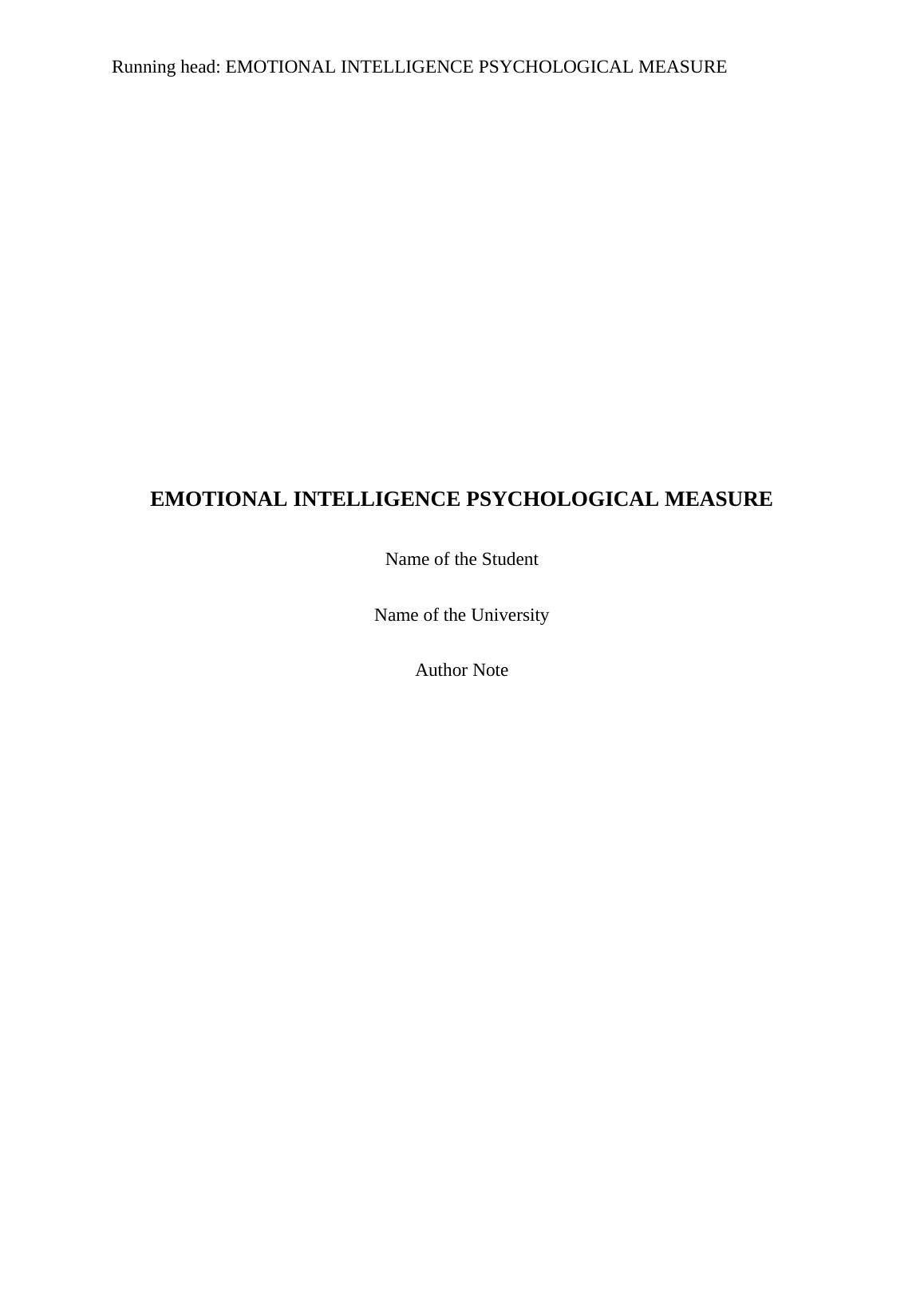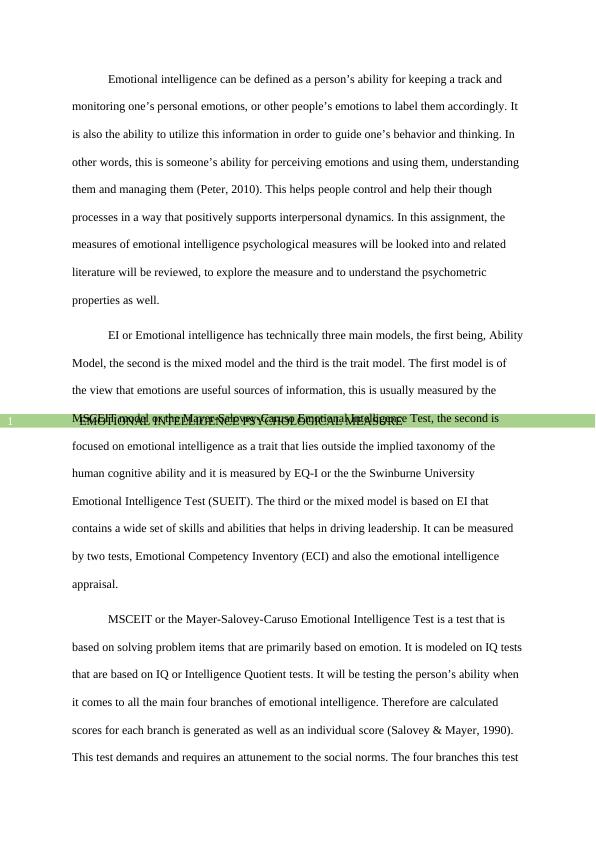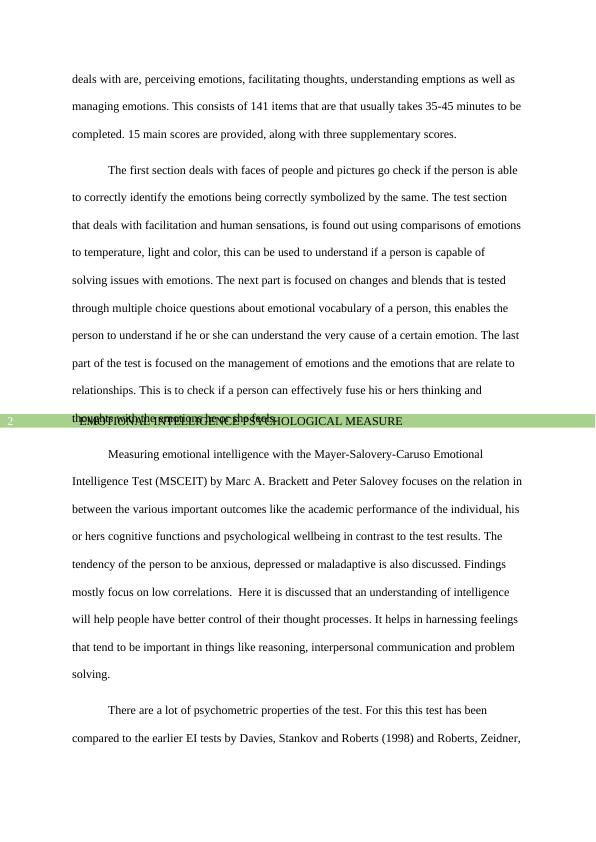Emotional Intelligence-psychological Measure Assignment 2022
7 Pages1925 Words21 Views
Added on 2022-09-21
Emotional Intelligence-psychological Measure Assignment 2022
Added on 2022-09-21
ShareRelated Documents
Running head: EMOTIONAL INTELLIGENCE PSYCHOLOGICAL MEASURE
EMOTIONAL INTELLIGENCE PSYCHOLOGICAL MEASURE
Name of the Student
Name of the University
Author Note
EMOTIONAL INTELLIGENCE PSYCHOLOGICAL MEASURE
Name of the Student
Name of the University
Author Note

EMOTIONAL INTELLIGENCE PSYCHOLOGICAL MEASURE1
Emotional intelligence can be defined as a person’s ability for keeping a track and
monitoring one’s personal emotions, or other people’s emotions to label them accordingly. It
is also the ability to utilize this information in order to guide one’s behavior and thinking. In
other words, this is someone’s ability for perceiving emotions and using them, understanding
them and managing them (Peter, 2010). This helps people control and help their though
processes in a way that positively supports interpersonal dynamics. In this assignment, the
measures of emotional intelligence psychological measures will be looked into and related
literature will be reviewed, to explore the measure and to understand the psychometric
properties as well.
EI or Emotional intelligence has technically three main models, the first being, Ability
Model, the second is the mixed model and the third is the trait model. The first model is of
the view that emotions are useful sources of information, this is usually measured by the
MSCEIT model or the Mayer-Salovey-Caruso Emotional Intelligence Test, the second is
focused on emotional intelligence as a trait that lies outside the implied taxonomy of the
human cognitive ability and it is measured by EQ-I or the the Swinburne University
Emotional Intelligence Test (SUEIT). The third or the mixed model is based on EI that
contains a wide set of skills and abilities that helps in driving leadership. It can be measured
by two tests, Emotional Competency Inventory (ECI) and also the emotional intelligence
appraisal.
MSCEIT or the Mayer-Salovey-Caruso Emotional Intelligence Test is a test that is
based on solving problem items that are primarily based on emotion. It is modeled on IQ tests
that are based on IQ or Intelligence Quotient tests. It will be testing the person’s ability when
it comes to all the main four branches of emotional intelligence. Therefore are calculated
scores for each branch is generated as well as an individual score (Salovey & Mayer, 1990).
This test demands and requires an attunement to the social norms. The four branches this test
Emotional intelligence can be defined as a person’s ability for keeping a track and
monitoring one’s personal emotions, or other people’s emotions to label them accordingly. It
is also the ability to utilize this information in order to guide one’s behavior and thinking. In
other words, this is someone’s ability for perceiving emotions and using them, understanding
them and managing them (Peter, 2010). This helps people control and help their though
processes in a way that positively supports interpersonal dynamics. In this assignment, the
measures of emotional intelligence psychological measures will be looked into and related
literature will be reviewed, to explore the measure and to understand the psychometric
properties as well.
EI or Emotional intelligence has technically three main models, the first being, Ability
Model, the second is the mixed model and the third is the trait model. The first model is of
the view that emotions are useful sources of information, this is usually measured by the
MSCEIT model or the Mayer-Salovey-Caruso Emotional Intelligence Test, the second is
focused on emotional intelligence as a trait that lies outside the implied taxonomy of the
human cognitive ability and it is measured by EQ-I or the the Swinburne University
Emotional Intelligence Test (SUEIT). The third or the mixed model is based on EI that
contains a wide set of skills and abilities that helps in driving leadership. It can be measured
by two tests, Emotional Competency Inventory (ECI) and also the emotional intelligence
appraisal.
MSCEIT or the Mayer-Salovey-Caruso Emotional Intelligence Test is a test that is
based on solving problem items that are primarily based on emotion. It is modeled on IQ tests
that are based on IQ or Intelligence Quotient tests. It will be testing the person’s ability when
it comes to all the main four branches of emotional intelligence. Therefore are calculated
scores for each branch is generated as well as an individual score (Salovey & Mayer, 1990).
This test demands and requires an attunement to the social norms. The four branches this test

EMOTIONAL INTELLIGENCE PSYCHOLOGICAL MEASURE2
deals with are, perceiving emotions, facilitating thoughts, understanding emptions as well as
managing emotions. This consists of 141 items that are that usually takes 35-45 minutes to be
completed. 15 main scores are provided, along with three supplementary scores.
The first section deals with faces of people and pictures go check if the person is able
to correctly identify the emotions being correctly symbolized by the same. The test section
that deals with facilitation and human sensations, is found out using comparisons of emotions
to temperature, light and color, this can be used to understand if a person is capable of
solving issues with emotions. The next part is focused on changes and blends that is tested
through multiple choice questions about emotional vocabulary of a person, this enables the
person to understand if he or she can understand the very cause of a certain emotion. The last
part of the test is focused on the management of emotions and the emotions that are relate to
relationships. This is to check if a person can effectively fuse his or hers thinking and
thoughts with the emotions he or she feels.
Measuring emotional intelligence with the Mayer-Salovery-Caruso Emotional
Intelligence Test (MSCEIT) by Marc A. Brackett and Peter Salovey focuses on the relation in
between the various important outcomes like the academic performance of the individual, his
or hers cognitive functions and psychological wellbeing in contrast to the test results. The
tendency of the person to be anxious, depressed or maladaptive is also discussed. Findings
mostly focus on low correlations. Here it is discussed that an understanding of intelligence
will help people have better control of their thought processes. It helps in harnessing feelings
that tend to be important in things like reasoning, interpersonal communication and problem
solving.
There are a lot of psychometric properties of the test. For this this test has been
compared to the earlier EI tests by Davies, Stankov and Roberts (1998) and Roberts, Zeidner,
deals with are, perceiving emotions, facilitating thoughts, understanding emptions as well as
managing emotions. This consists of 141 items that are that usually takes 35-45 minutes to be
completed. 15 main scores are provided, along with three supplementary scores.
The first section deals with faces of people and pictures go check if the person is able
to correctly identify the emotions being correctly symbolized by the same. The test section
that deals with facilitation and human sensations, is found out using comparisons of emotions
to temperature, light and color, this can be used to understand if a person is capable of
solving issues with emotions. The next part is focused on changes and blends that is tested
through multiple choice questions about emotional vocabulary of a person, this enables the
person to understand if he or she can understand the very cause of a certain emotion. The last
part of the test is focused on the management of emotions and the emotions that are relate to
relationships. This is to check if a person can effectively fuse his or hers thinking and
thoughts with the emotions he or she feels.
Measuring emotional intelligence with the Mayer-Salovery-Caruso Emotional
Intelligence Test (MSCEIT) by Marc A. Brackett and Peter Salovey focuses on the relation in
between the various important outcomes like the academic performance of the individual, his
or hers cognitive functions and psychological wellbeing in contrast to the test results. The
tendency of the person to be anxious, depressed or maladaptive is also discussed. Findings
mostly focus on low correlations. Here it is discussed that an understanding of intelligence
will help people have better control of their thought processes. It helps in harnessing feelings
that tend to be important in things like reasoning, interpersonal communication and problem
solving.
There are a lot of psychometric properties of the test. For this this test has been
compared to the earlier EI tests by Davies, Stankov and Roberts (1998) and Roberts, Zeidner,

End of preview
Want to access all the pages? Upload your documents or become a member.
Related Documents
Emotional Intelligence: Critical Analysis of MSCEIT Modellg...
|11
|2546
|245
Critical Evaluation of Two Tests of Personality and Intelligencelg...
|6
|2105
|285
Emotional Intelligence - Reflective Journallg...
|5
|683
|17
Emotional Intelligencelg...
|8
|1750
|481
Emotional Intelligence: Critical Analysis of Five Articleslg...
|18
|4049
|30
Psychometric Evaluation of Global Emotional Intelligence Test (GEIT)lg...
|36
|10493
|186
